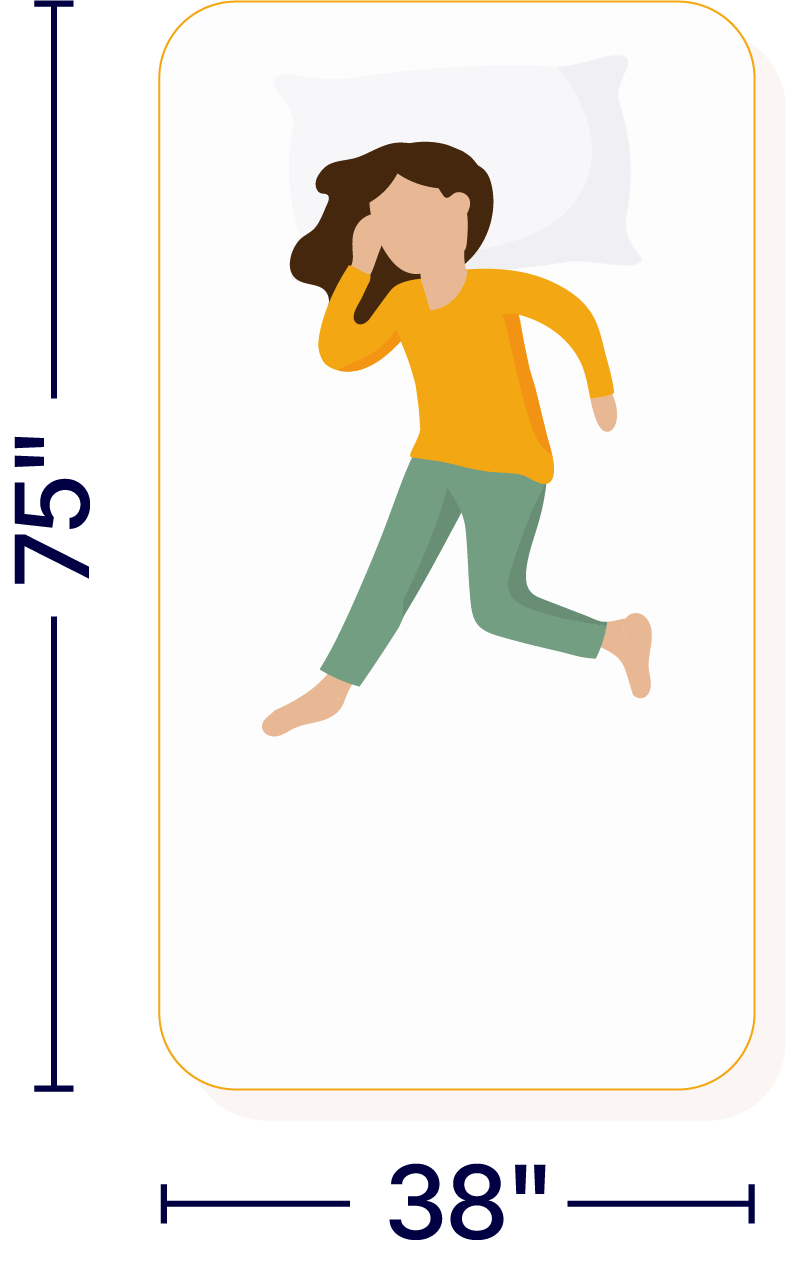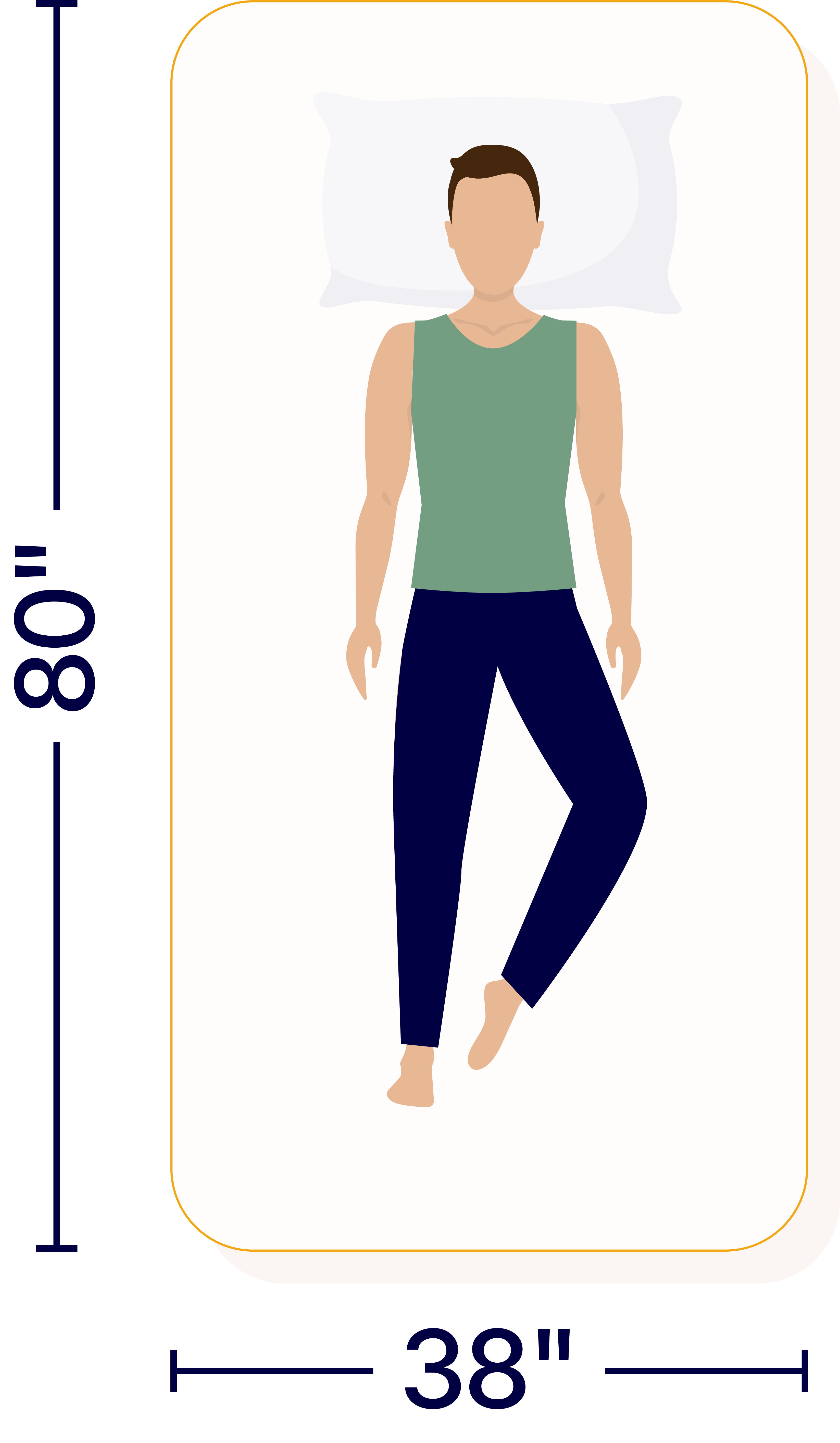No, a twin bed frame is five inches too short for a twin XL mattress. If your bed frame only has a headboard, the mattress will hang off the end of the bed. If you also have a footboard, however, the mattress won’t sit flat on the frame at all. It’s best to purchase a twin XL bed frame that properly fits the size of the mattress.
READ MORE: Types of bed frames: which style is right for you?
Twin vs Twin XL: Which Is Better for You? (2025)
Updated: March 3, 2025 | Published: July 2, 2024It’s time to upgrade your child’s bed or furnish that snug guest room, and you’re faced with a decision—twin XL vs twin mattress? Both options seem similar at first glance, but subtle differences could significantly affect sleep quality and room space.
Let’s dive into the details of a twin XL vs twin-size mattress to help you find your perfect fit.
Looking for other mattress sizes? Check out our guide to mattress sizes in Canada.
| Feature | Twin Mattress | Twin XL Mattress |
|---|---|---|
Dimensions | 38″ wide x 75″ long | 38″ wide x 80″ long |
Surface Area | 19.8 square feet | 21.1 square feet |
Ideal For | Children and pre-teens
| Taller teenagers and adults
|
Room Size | At least 7′ x 10′ | At least 7′ x 11′ |
Leg Room | Suitable for people up to 5’9″ | Better for people over 5’9″ |
Bedding Cost | Generally less expensive due to common size availability | Slightly higher due to specialized size |
Future Proof | May need to upgrade as child grows | Longer length accommodates growth spurts |
Space Efficiency | Excellent for very small rooms | Requires slightly more length; good for narrow rooms |
Pros | Fits well in small spaces
| Extra length for tall sleepers
|
Cons | May be too short for adults
| Slightly higher initial cost
|
What size is a twin mattress?
A twin mattress measures 38 inches by 75 inches. Often the go-to choice for children’s rooms and smaller living spaces, this is a compact yet comfortable option for a single sleeper up to 5’9″ tall. However, taller sleepers might find their feet hanging off the edge of the bed.
A twin mattress fits neatly into rooms at least 7 feet by 10 feet, providing ample space for furniture and play. It’s ideal for bunk beds and daybeds, making it a great starting point for little ones or a snug fit in limited spaces.
READ MORE: Get our ranked list of the best twin mattresses in Canada

What size is a twin XL mattress?
The twin XL measures 38 inches by 80 inches. With the extra 5 inches in length over the twin, it is ideal for taller sleepers needing that extra legroom. This mattress size is popular in college dorms and offers a generous sleeping area without taking up more floor space.
The twin XL bridges the gap between youth beds and larger, more spacious options, ensuring a comfortable night’s sleep without the sprawl. For couples with different sleep needs, two twin XL mattresses side by side make up a split king, allowing for personalized comfort without compromising closeness.
The twin XL is ideal for narrow, longer rooms measuring roughly 7′ x 10′. It works best in spaces that accommodate its extra length without making the room feel cramped.

What is the difference between a twin XL vs twin mattress?
A twin XL mattress is five inches longer than a twin mattress. The primary difference between the twin vs twin XL mattresses is their dimensions, particularly the length. A twin mattress typically measures 38 inches wide by 75 inches long, while a twin XL mattress also measures 38 inches wide but is 80 inches long.
The extra 5 inches in length makes the twin XL more suitable for taller individuals, including teenagers and adults, providing additional legroom to accommodate their height. The twin XL is commonly found in college dorm rooms, hostel bunks, and military barracks. It’s often used by adults with limited space who need more length than a twin bed offers.
What mattress size should I choose?
When deciding between a twin vs twin XL-size mattress, consider factors like comfort, room size, and longevity. A twin mattress might fit seamlessly into a smaller room, but the twin XL’s extra length could be a game-changer for growing teens or taller adults.
We have broken down several factors for you to consider when deciding between a twin XL vs twin bed.
Cost and Availability
Twin mattresses are widely available from several brands. If you’re shopping for kids, you can find a wide variety of options, including themed beds and those with added safety features.
You can also easily find twin bedding in various styles featuring everything from superheroes to movie characters.
Given their widespread use and availability, as well as smaller amounts of materials used, twin mattresses tend to be slightly more affordable than twin XL. However, the price difference between a twin vs twin XL is often negligible, so cost may not affect your buying decision.
Twin XL bedding is also less common but still accessible, especially in specialty bedding stores or online.
Sleeper’s Height and Sleep Position
Twin mattresses are ideal for a single child or adult up to about 5’9″ in height. The narrower width may limit movement if you are an active sleeper or tend to change positions frequently.
If you are taller than 5’9″, the twin XL offers those extra inches in length that can make all the difference in a good night’s sleep.
However, since the twin XL mattress is just as wide as a twin mattress, its narrow width could constrain your movements if you’re an active sleeper. You might be better off considering a full-size bed instead of a twin.
Room Size and Space
The twin mattress measures a compact 38 inches wide by 75 inches long, making it perfect for smaller rooms.
Placing a twin bed in the middle of a room at least 7 feet by 10 feet, you’d have about 2 to 2.5 feet of space on either side and at the foot of the bed. This allows enough space for essential furniture, like a nightstand or dresser, and easy movement throughout the room.
The twin XL measures 38 inches by 80 inches. Consider a room at least 7 feet by 11 feet for a bed this length. The extra foot in length accommodates the mattress’s additional 5 inches, ensuring the room doesn’t feel overcrowded.
Placing the twin XL bed in the centre of this room leaves about 2 to 2.5 feet of space on either side and at the foot of the bed. This layout also allows enough space for essential furniture, like a nightstand or dresser, and easy movement throughout the room.
If you’re working with an even smaller space, you can gain valuable square footage by placing the bed against one wall. However, while this layout maximizes open floor space and leaves more room on the opposite side, it might limit access to one side of the bed.
Always consider the balance between bed size, essential furniture, and the room’s intended use to create a functional sleeping environment.
Future Planning
Twin beds are an excellent choice for small children transitioning out of cribs. This mattress size has plenty of room for them to change positions while sleeping. Depending on the child’s size, you may also have enough room for storytime and bedtime cuddles before they start sleeping independently.
However, if you have kids closer to their teenage years, consider a twin XL to accommodate their growth spurts. This ensures the mattress lasts well into their teenage years, and may even move with them into their first apartment.
(Not sure what kind of mattress is right for you? Check out our guide to types of mattresses to help you decide on the right option.)
FAQ
Yes, you can. This is called a split king bed. It’s ideal if you and your partner have different sleep preferences—for example, if one of you prefers foam and the other a hybrid, or a plush surface versus a medium-firm mattress. This also allows you to use a split adjustable bed for an even more customized sleep experience.
READ MORE: Get our ranked list of the best adjustable beds in Canada
No, twin sheets will be five inches too short to fit a twin XL mattress. Twin XL sheets can be tricky to find, but some brands like Douglas sell both a twin XL mattress and matching sheets. No need to worry about finding the correct size—now you just need to consider whether to buy bamboo vs cotton sheets.
Despite its longer length, a twin XL mattress provides a comfortable night’s sleep for only one person. This mattress size is intended for taller people rather than multiple people. Don’t worry, though—a child and parent can still enjoy a cozy cuddle with a twin XL mattress.
Choosing between a twin vs twin XL mattress boils down to personal needs. Consider your space, comfort needs, and who will sleep on it. Whether it’s for a child’s first big-kid bed, a college dorm, or a guest room, both options offer unique benefits.
Reflect on your current and future needs, and let that guide your decision toward the perfect sleep option.
Our goal is to provide the information you need to find the mattress that’s right for you. Get started with some of our most popular mattress shopping resources:
- Best Mattress Guides: Best Mattress Canada, Best Mattress In a Box
- Reviews: Douglas Original, Logan & Cove Choice, Juno, Octave Vista
- Comparisons: Douglas vs Endy, Douglas vs Casper
We use independent, third-party engineering firms (commissioned by us) with the APEGA stamp of approval to conduct mattress testing on our behalf, using publicly available data. We review and test all mattresses on 40+ criteria we think are important to you, including price, country of manufacture, sleep trial, warranty, features, materials used, motion isolation and edge support ratings, customer satisfaction reviews, returns, and refunds.
